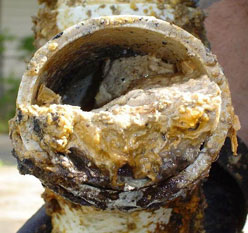It’s a no-brainer, families across Windsor-Essex County will have an increased amount of cooking fat waste that will be generated from all of the great dinners over the holidays. The DRCC would like to remind everyone that sewer backups caused by clogged lines from FOG (fats, oils and greases) can cause damage to homes, public infrastructure damage and can also affect public health. If the lines are clogged, then the lines cannot move our sanitary waste effectively through the system.

FOG Clogging Public Infrastructure
Sanitary sewers are connected to homes and their kitchen and bathroom sinks, dishwasher, toilets and floor drains. The wastewater from these lines goes to a plant for treatment prior to be flushed back into a river or stream. Storm sewers are typically located in a curbed area on a street, a parking lot or alley way. Untreated rainwater or runoff is collected here and is directed back into a river or stream. It is extremely important that nothing is poured into the storm sewer since this water is untreated.
Tips for a happy and safe holiday:
- Scrape food scraps and grease solids (let them cool down in a dish/jar etc. and place into the garbage (NOT down the sink, garbage disposal drain, toilet etc.)
- Grease spills can be cleaned up by using paper towels or other absorbent material such as cat litter and place in the garbage
- Capture FOG material from dishes by wiping them with a paper towel before washing in the sink or dishwasher
- Capture food waste by using a strainer when doing dishes and scrape off excess food before loading into the dishwasher
- Do not pour anything at all down the drain, sewers or even onto the ground outside (this can include solvents, waste motor oil, paint, gasoline or other household hazardous chemicals)
- Take advantage of the Essex-Windsor Solid Waste Authority Household Chemical Waste Depot to dispose of chemical wastes safely for public health and the environment
- Read the City of Windsor’s Proper Disposal of Household Liquid Waste Brochure
Check out the DRCC’s Wastewater: Where does it go video!
Have you ever wondered what happens to water and other substances when they are flushed down our drains and toilets? It shouldn’t be a mystery, and the City of Windsor and the Detroit River Canadian Cleanup initiative created a wastewater video to help de-mystify the topic, and educate viewers. Most of us don’t really think about what happens to water once it’s flushed or drained away and out of sight. It all has to go somewhere, though, and what we put down our drains can have a big impact on our home and our environment.
The video follows the flow of wastewater from a home in Windsor to one of two places: the waste water treatment plant or the Detroit River. There are many household items that are branded as ‘flushable’ that really shouldn’t be put down the toilet. What’s more, some items go directly back into our rivers and lakes without treatment.
Image Credit: No name. No Author. Clogged infrastructure Image. Retrieved from: https://www.sussexcountyde.gov/tips-how-avoid-sewer-clogs-fats-oils-and-grease-fog

